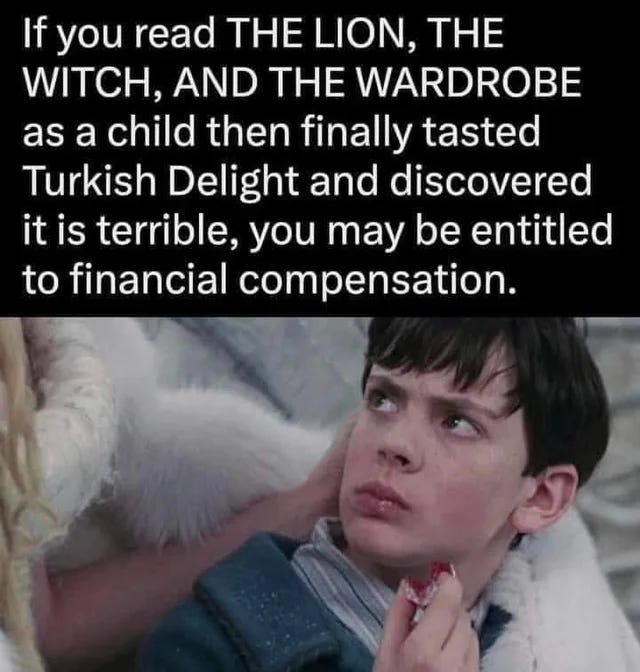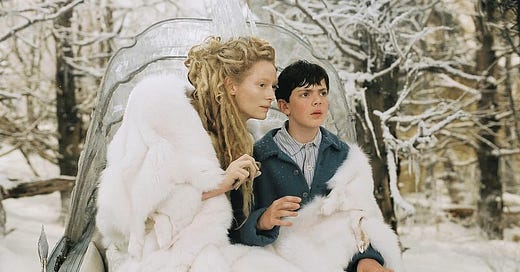More than Turkish Delight: Edmund and the slippery slope of evil
The Lion, the Witch and the Wardrobe: Chapters 4 - 5
Earlier this year I wrote about why I secretly hated the Chronicles of Narnia as a child. In it, I made a promise to read and review all seven books, so as to see if my childhood memories fit the actual quality of the stories. And so I dusted off my old, single-volume Brazilian edition from the shelf and began reading. This week, we continue to explore The Lion, the Witch, and the Wardrobe, Chapters Four: “Turkish Delight” and Five: “Back on This Side of the Door”.
Edmund’s Betrayal
Last we saw of Edmund, he had just met the White Witch in the middle of the Lantern’s Waste. The reader, informed by Tumnus in Chapter Two, already knows she is evil, and our first impressions quickly confirm this. The Witch is stern, prideful, and upon discovering Edmund is a Son of Adam, tries to kill him… before deciding he can be useful.
As she spoke these words she rose from her seat and looked Edmund full in the face, her eyes flaming; at the same moment she raised her wand. Edmund felt sure that she was going to do something dreadful but he seemed unable to move. Then, just as he gave himself up for lost, she appeared to change her mind.
Her tone changes in a moment. The Witch talks to Edmund in a manner at the same time faux-motherly and flattering, not-so-subtly playing with his vices, both physical and spiritual.
First, the Witch invites Edmund on the sledge and covers him with her coat, shielding him from winter’s cold. Then she offers him a drink — implied to be alcoholic —, and, in quick succession, asks what he would like best to eat. In a famous passage, Edmund asks for his thirty pieces of silver: Turkish Delight.

Edmunds feasts on the sweets. Through glutony, the Witch breaks his body, and his mind soon follows. Edmund — almost abscent-mindly — tells the weird pale lady who tried to do him harm all about his sibilings, including Lucy’s meeting with Tumnus.
It all happens so quick neither the reader nor Edmund has much time to process the consequences of the exchange. Edmund begins the scene scared of the Witch; he ends it promising to bring her his siblings. Let us look more closely at what is happening here.
At the beginning, Edmund is afraid of the Queen, and this fear is why he gets in the sledge in the first place:
Edmund did not like this arrangement at all but he dared not disobey; he stepped on to the sledge and sat at her feet, and she put a fold of her fur mantle round him and tucked it well in.
He then accepts a hot beverage from her. You could argue he is still acting out of fear, but the text actually suggests it is out of cold:
“Perhaps something hot to drink?” said the Queen. “Should you like that?” “Yes please, your Majesty,” said Edmund, whose teeth were chattering.
(my emphasis)
Which is plain foolishness. The weather is harsh, but nowhere near life-threatening (remember, Lucy is walking around these same woods without a coat). Edmund is, in short, putting himself in a danger way greater than cold for comfort.
After that, he literally accepts candy from a stranger:
“It is dull, Son of Adam, to drink without eating,” said the Queen presently. “What would you like best to eat?”
“Turkish Delight, please, your Majesty,” said Edmund.
Notice the progression, both for the Witch’s temptation and Edmund’s fall. The beverage she offered for warmth; however unwise it may have been to accept it, Edmund was still fulfilling an immediate need. But the food is offered because it would be dull otherwise, and Edmund can even choose anything he wants! A luxury. Edmund swift and imperceptibly goes from cowardice to gluttony.
He soon forgets anything else in his pleasure — including that he is in danger. When he finishes eating, the Witch moves her attack from gluttony to pride:
“It is a lovely place, my house,” said the Queen. “I am sure you would like it. There are whole rooms full of Turkish Delight, and what’s more, I have no children of my own. I want a nice boy whom I could bring up as a Prince and who would be King of Narnia when I am gone. While he was Prince he would wear a gold crown and eat Turkish Delight all day long; and you are much the cleverest and handsomest young man I’ve ever met.”
[…]
“You are to be the Prince and — later on — the King; that is understood. But you must have courtiers and nobles. I will make your brother a Duke and your sisters Duchesses.”
Edmund is promised a life of hedonism. It is a rather silly image, even before the narrator explicitly points it out1: a vision of royalty made all of luxury and none of kingship, a spoiled child dressed in gold and using his power to eat candy all day. A sort of King Joffrey, likely to die the same way.
But the silly vision has hints of hellish. Edmund is promised he will be King, and his sibilings Duke and Duchesses — that is to say, his subjects. It is hard to resist the interpretation that Edmund, the middle child, the one who resents the natural authority of Peter and the misguided maturity of Susan, is attracted to this kingly life precisely because it offers him a chance to turn the tables and order his sibilings around. Edmund’s view of a perfect life is not just hedonistic like an animal’s; it is tyranical like a demon’s.
Judas’s Advocate
It is easy, upon reflection, to feel sorry for Edmund: he is a child, alone in the snow, who has just been kidnapped and drugged by an adult. Had Edmund not given the information the Witch wanted right away, she would likely have taken it from him by force.
However this compassion might be adequate, it does not absolve Edmund. Maybe, had he told nothing to the Witch, all would still happen the same way. But, as Aslan says:
"To know what would have happened, child?" said Aslan. "No. Nobody is ever told that."
Prince Caspian, Chapter 10: “The Return of the Lion”
Harsh as it may sound, the question is not whether Edmund was in danger: it is whether, given his circumstances, he did the best he could. And, looking at the passages we just described, it becomes clear he did not.
And so the betrayal is complete. The Witch makes Edmund promise to bring back his brother and sisters and lead them to her home. Soon after the Witch leaves, Lucy returns. The little sister reveals to Edmund the truth: the White Witch is an usurper tyrant who turns innocent people into stone. In four sentences, Lucy unknowingly destroys any plausible deniability Edmund could conjure for himself regarding the Witch’s true nature. From now on, anything he does is of his own free choice.
Edmund’s betrayal is one of Lewis’s best scenes. Like a good fairy-story, it invites allegory and interpretation not despite but because it is not trying to mean anything beyond itself. It is concrete, rather than abstract. Edmund’s dilemma feels real and universal, because it is particular. It offers a clear example of how one slides into evil: from cautious approach to needful bargain, to “harmless excesses” to dark ambition, and finally to idolatry.
True, but Not Sensible
Edmund and Lucy come back to our world, and “now we come to one of the nastiest things in this story”. Lucy excitedly tells Peter and Susan that Edmund has also been to Narnia, but Edmund decides to humiliate his little sister and says that the two of them had been playing make-believe. It is, as the narrator points out, mean and spiteful, an act of cruelty done with no purpose (not even getting the four of them to the Witch; if anything, this makes Edmund’s plan harder).
With Lucy crying, Peter and Susan go to the Professor for help. They fear their sister might be going mad, or becoming a liar. I mentioned this scene in the previous part, for it is emblematic of who the Professor is. Peter and Susan, undoubtedly, expected the Professor to confirm either of their fears and offer a “grown-up” solution. Instead, he does the only thing they did not expect: he examines Lucy’s claim, that there is a country inside the wardrobe, in its own merits.
The Lucy trilemma goes as follows:
Lucy is either a liar, mad, or telling the truth;
Lucy is neither a liar (“does your experience lead you to regard your brother or your sister as the more reliable?”) nor mad (“One has only to look at her and talk to her to see that she is not mad”);
Therefore, Lucy is telling the truth.
Peter’s objection: Narnia can’t be real, because if things are real, they’re “there all the time.”
The Professor’s response: says who, smartass?
Susan’s objection: Narnia can’t be real, for there was no time for Lucy to go there. She was away for less than a minute, but pretended to be gone for hours.
The Professor’s response: that makes the story more, not less, probable. For if there is another world, we should not be surprised if it had also a time of its own. But Lucy is too young to have invented this idea by herself. Therefore, Narnia is probably real.
Logic. Like they should teach in schools. If the reader will indulge me as a quote myself:
The Professor is a man more concerned with the truth than with being sensible.
“Why The Lion, the Witch and the Wardrobe is still a classic”
Which, again, makes for a marvelous parallel with Susan, who more than once in books to follow will rather be wrong than be seen as unreasonable.
That said, the Professor's advice is a very practical one: all take care of their own business. And so the children go back to a semblance of normalcy, until some time later, they are led by fate (and by a mob of tourists) to go inside the wardrobe once more.
But of course, they don’t lock themselves in. That would be very foolish.
“Why not now?” said Edmund. His face had become very red and his mouth and fingers were sticky. He did not look either clever or handsome, whatever the Queen might say.




This is amazing
Love this scene and it is one that's always stuck with my brother and I, and is one that we've discussed many times over the years.
I must admit that this makes me wish we could include you in one of those discussions good sir as this first story of the Chronicles of Narnia is the most fascinating of them all. Good job good sir!